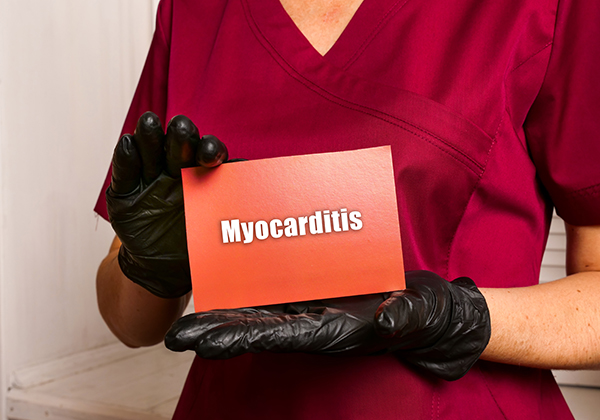Having been diagnosed with Rheumatoid Arthritis (RA) in 2003, I am no stranger to living with chronic pain and fatigue. Little did I know that a dozen years later I would be struck with an illness that would completely debilitate me.
January 2015 began like most other years. Run down from the holiday season, I developed a nasty case of bronchitis. Usually, a ten-day course of antibiotics and plenty of rest was enough to get me back on my feet. This time, however, was completely different. Along with the tightness in my lungs, I developed a severe pain in my left chest. It felt like my heart was in a vice while an elephant was sitting on me. No amount of rest or over-the-counter meds would alleviate the pain and pressure. Worse yet, lying down made it worse, so sleeping was nearly impossible. I was getting more exhausted and weaker by the day.
One afternoon at work, the pressure became unbearable. The pain was radiating down my arm and I started to break out in a sweat. Worried I was having a heart attack, I left work and drove myself to the emergency room, not realizing I wouldn’t ever return to that job.
Once at the ER, they immediately performed the standard tests for a heart attack: EKG and blood work. They also gave me an aspirin and a nitro glycerin tablet, which only made the pain worse. Both tests came back relatively normal, yet I was still in severe distress. The doctor’s attitude towards me took a slight shift and the questioning began: Have you been under a lot of stress lately? Do you have acid reflux? Do you suffer from anxiety? How often do you take pain meds? I was a woman in her early 50s and I could tell my symptoms were being looked at with suspicion.
Thankfully, the cardiologist they called in noticed a slight glitch in my EKG and ordered more tests. Once completed, he diagnosed me with pericarditis. From my own experience and the stories of others, I have since learned I was very lucky to be assessed by a physician who was familiar with the condition.
Pericarditis is inflammation of the pericardium – the thin membrane that surrounds and protects your heart. It can be caused by a viral or bacterial infection, heart surgery, or an auto immune disease. In my case, it was both the bronchitis and RA that triggered the condition. It can be acute: a single occurrence that comes on and resolves quickly – or chronic: a lifetime of reoccurrences and flare ups. Mine would become chronic.
This bout caused me to go on disability and eventually lose my job. After six months, my life returned to relatively normal. Although, every now and then, when I would get sick, the tightness would rise up, reminding me of the chance it could come back with a vengeance.
In January, 2020, I experienced another bout of bronchitis. Within three days I was back in the ER and diagnosed with pericarditis. Instead of getting better, however, I got progressively worse. I was unable to walk across a room without being in extreme pain and losing my breath. I would experience hot flashes and dizzy spells that lasted an entire day. Sleeping was impossible. I was completely unable to function yet, somehow, got myself back into the ER. This time, however, the attending on call was not familiar with the condition. It would take 24 hours before any doctor bothered to use their stethoscope. I could tell they suspected that I was only seeking pain meds. Eventually, my cardiologist was able to see me and order a full battery of tests including an angiogram and echocardiogram. They both came back clear and I was sent home with ibuprofen and a few other meds, which were completely ineffective.
I bounced back and forth between my rheumatologist and cardiologist for about two weeks, each stating they couldn’t help me and to speak to the other. I finally called both of them in tears stating I couldn’t take it anymore. My cardiologist agreed to order a cardiac MRI. Only then, did the pericardial inflammation show up along with some effusion (fluid around the heart).
It’s been over eight months and I am still only at 60%. My doctors have been working together to find a medication regimen to help. The heavy doses of prednisone have caused me to gain 20 pounds and have altered the shape of my face. I am still relying on narcotics to alleviate the pain at least every other day. I wonder daily if I will improve, or if this is to be my new normal.
Through support groups and my own research, I have learned that pericarditis rarely presents in the classic way. It is quite common, as in my case, for most of the tests to come back negative even though the patient is clearly suffering. Additionally, symptoms will often come and go, so they can be missed if testing isn’t done at the right time. Adding insult to injury, most cardiologists – and even more ER physicians – are completely unfamiliar with the condition. Many patients are suspected of inventing their symptoms, making them feel like they are losing their mind and very alone.
Thankfully, my team of doctors do not dismiss my symptoms and are doing the best they can to help me. However, studies on this condition are limited. Known “remedies” are slow to make a difference and rarely 100% effective. Much more research needs to be done to educate physicians and discover treatments. In the meantime, I will take every opportunity to shout from the rooftops about this debilitating illness. Hopefully, if we raise our voices loud enough, we can find a cure.



























